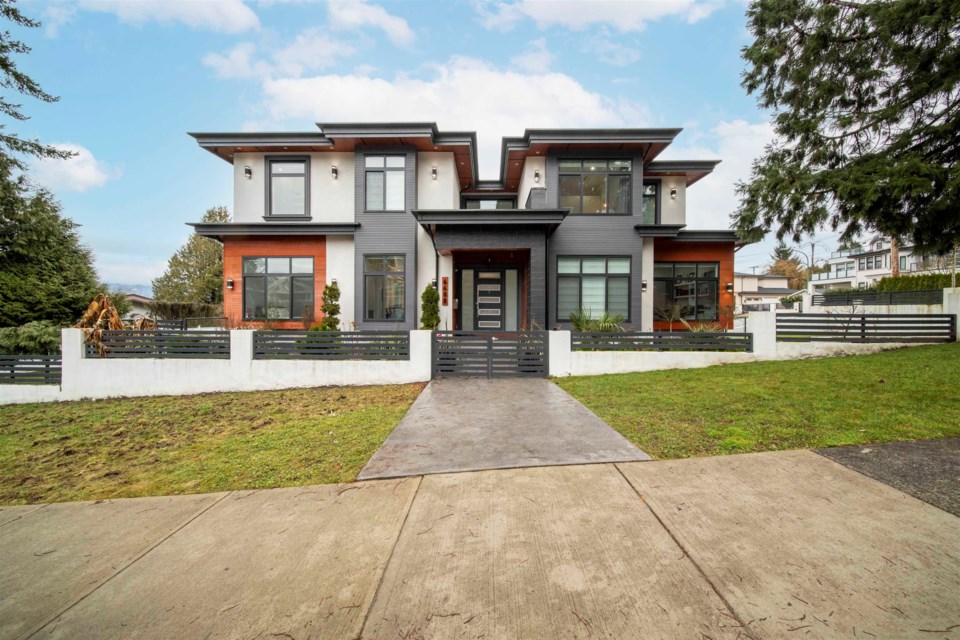More Burnaby houses owners are being lured by rising prices and putting their homes on the market for prices that are definitely pushing the envelope.
The local single-detached house market shows at least a dozen new listings at more than $4 million – with some closed to $5 million and one priced at more than $6 million. Most are relatively new construction and modern, but one least one is more than 30 years old.
You can scroll through the photos above, but here is a sample of them.
- A house on Whelen Court that is priced at more than $6 million that includes a pool.
- A house in Buckingham Heights that is priced at $4.9 million
- A house on Sperling Avenue that has seven bedrooms and seven bathrooms.
- A 32-year-old house on Burke that has six bedrooms and is going for nearly $4.6 million, despite its age.
It’s definitely a good time to be selling, but only the market will tell the tale if these prices will be met by buyers.
The Real Estate Board of Greater Vancouver's monthly report for March shows that two out of three Burnaby areas surpassed the $2-million mark for a benchmark price last month.
Burnaby South currently sits at a benchmark price of $2,067,100 (+4.2% in one month) while Burnaby North was at $2,021,400 (+4.9% in one month).
Burnaby East stayed under $2 million at $1,776,300 (+2.7% in one month).
Meanwhile, a forecast published by the Canada Mortgage and Housing Corporation noted that, despite the expected moderation in prices and the number of sales throughout Canada, costs growth will continue to outpace income growth in several major cities – placing “greater pressure on the affordability of home ownership.”
CMHC projects the growth rate of home prices in the Greater Vancouver region will not continue on its double-digit rate beyond Q1 2022, and the rate of growth in prices will actually fall to below 5% year-over-year by 2023.
Braden Batch, CMHC’s senior analyst of market insights (and author of the outlook’s chapter on Vancouver), noted there are variables in the projection of continued growth for the Lower Mainland’s real estate market. Batch noted that “trouble in the national and global markets” – ranging from interest rates to other economic pressures on B.C. home buyers – could slow market activity to a greater degree than what’s projected if Metro Vancouver cannot remain insulated.
Similarly, total housing starts will fall this year in Metro Vancouver and shift towards row and semi-detached units, but shortage in skilled trade labour and supply chain bottlenecks will continue to push costs of construction higher.
“Vancouver will emerge from the pandemic with a strong economy,” Batch said in the report. “Immigration will be a major demand driver over the next few years, but a lack of supply at all levels and tightening credit has worsened affordability.”
The theme of continued unaffordability stretches to the rental market. The CMHC is projecting Vancouver’s rental vacancy rate to remain around 1%, all while the economic and migration rebound will put new pressures on demand, leading to rent increases.
“Long development timelines and the current level of construction won’t provide enough new units in the next three years to raise vacancy rates or to provide sufficient competition among property owners to lower rents,” Batch said. “Upward pressure on rents is inevitable for much of the market, particularly when rent controlled units turn over and reprice for the current market.”
Overall, the forecast projects the MLS average price for the Vancouver CMA to be in the range between a high of $1,459,000 and a low of $1,064,000 – showing no significant deviations from 2021’s average of $1,150,357 and demonstrably higher than the pre-COVID level of $923,070 recorded in 2019.
With files from Jess Balzer and the Canadian Press
Follow Chris Campbell on Twitter @shinebox44.



